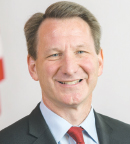On August 15, the U.S. Food and Drug Administration (FDA) granted accelerated approval to entrectinib (Rozlytrek) for adult and adolescent patients whose cancers have an NTRK (neurotrophic tyrosine receptor kinase) genetic fusion and for whom there are no effective treatments. Entrectinib was also approved for the treatment of adults with metastatic, ROS1-positive non–small cell lung cancer (NSCLC).
“We are in an exciting era of innovation in cancer treatment as we continue to see development in tissue-agnostic therapies, which have the potential to transform cancer treatment,” said FDA Acting Commissioner Ned Sharpless, MD.

Ned Sharpless, MD
This is the third time the FDA has approved a cancer treatment based on a common biomarker across different types of tumors rather than the location in the body where the tumor originated. It follows the policies that the FDA developed in a guidance document released in 2018.
“[This] approval includes an indication for pediatric patients 12 years of age and older who have NTRK fusion–positive tumors by relying on efficacy information obtained primarily in adults,” said Richard Pazdur, MD, Director of the FDA’s Oncology Center of Excellence and Acting Director of the Office of Hematology and Oncology Products in the FDA’s Center for Drug Evaluation and Research. “Efficacy in adolescents was derived from adult data, and safety was demonstrated in 30 pediatric patients.”
Trial Results
The efficacy of entrectinib was evaluated in four clinical trials studying 54 adults with NTRK fusion–positive tumors. The overall response rate was 57%, with 7.4% of patients having a complete response. Among the 31 responding patients, 61% had a response persist for 9 months or longer. The most common cancer locations were the lung, salivary gland, breast, thyroid, and colon/rectum.
Clinical studies also evaluated 51 adults with ROS1-positive lung cancer. The overall response rate was 78%, with 5.9% of patients having a complete response. Among the 40 responding patients, 55% had a response persist for 12 months or longer. ■

